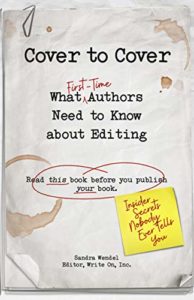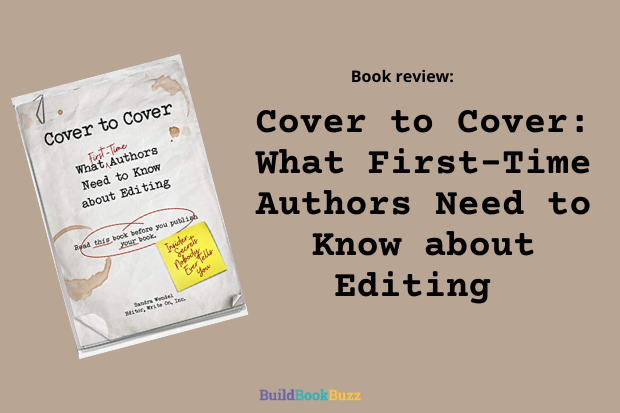Book review: Cover to Cover: What First-Time Authors Need to Know about Editing
Affiliate Disclosure: This post contains Amazon Associate links, which means if you click on them and make a purchase, I will receive a couple of pennies (at no extra charge to you).
“Do I need an editor for my book?”
I see this question repeatedly in a Facebook group that I moderate. The person asking usually doesn’t understand an editor’s role and how a good editor can make a difference. They’re often confused about the difference between an editor and a proofreader, too.
That’s why when author and editor Sandra Wendel sent me a copy of her new book, Cover to Cover: What First-Time Authors Need to Know about Editing, I decided to review it for you.
Here’s what you need to know about it.
What does Cover to Cover cover?
The first thing I do when I’m considering reading a nonfiction book is study the table of contents. Even with the first table of contents page missing from the Amazon “Look inside” feature for the print version, I could see that it covers what I’d expect it to.
 In fact, it might be too comprehensive. While the material addressed in “Part III: After the Edit: What Now?” is related to self-publishing, it has nothing to do with book editing. It left me wondering if Wendel added that section to give the print version a little more heft. (The publisher of one of my nonfiction books insisted on 110,000 words – gulp! – so the spine would be extra wide on a store shelf.)
In fact, it might be too comprehensive. While the material addressed in “Part III: After the Edit: What Now?” is related to self-publishing, it has nothing to do with book editing. It left me wondering if Wendel added that section to give the print version a little more heft. (The publisher of one of my nonfiction books insisted on 110,000 words – gulp! – so the spine would be extra wide on a store shelf.)
I think by the time you reach that final section of the book, you’ll be so antsy to improve your manuscript with what you’ve learned that you’ll skip that part.
Focus on the first two parts of the book. They will help you understand:
- What an editor will and won’t, can’t and shouldn’t, do for you and your book
- The different editing levels and how to determine which one you probably need
- Where to find the best editors
- Questions to ask an editor before hiring them (and what they’ll probably ask you, too)
- How to save money on editing costs by making your manuscript as good as it can be before turning it over to an editor
- Conventional book sections we expect to see in a book (the author recommends using an alternative word for the section usually titled “Appendix”)
Wendel sprinkles gems of wisdom throughout, including that you don’t want to use “Table of Contents.” That’s the mark of an amateur she says. Use “Contents” instead.
How will this book help you?
At a minimum, I hope it convinces you that you need an editor. Even the author hired an outside editor to review her manuscript. Follow her lead.
It does more than help you become better informed about how an editor will improve your manuscript. It can also make you a better writer. Wendel provides a great deal of writing advice and offers examples of before and after edits.
TIP: The editing examples are presented as Word file screenshots. Those and other images didn’t display well in my Kindle, so you might want to buy the print version. This is a resource you’re likely to refer to repeatedly, so it’s worth the extra expense.
Use it, too, to format your manuscript accordingly before sending it to the editor you contract with (after following the advice in the book to find just the right one).
This is important. I edit business books on occasion and the Word files often arrive in my inbox with what we might call unconventional formatting. And why not? How does someone who is busy running a successful business know what a book manuscript should look like in Word?
For that reason, I hope that Wendel’s editor colleagues will recommend this book to their clients before they start a project. When your manuscript arrives in your editor’s inbox with the right formatting, you won’t be paying your editor to format it for you.
What surprised me
I recommend reading Cover to Cover before finishing your next or current book, but I’m reluctant to recommend reading it cover to cover. There’s content in the third part that I take issue with.
In Chapter 13, “What I Know about the New World of Publishing,” the author refers to literary agents as “the pond scum of the publishing world.”
Ouch.
She also rails against traditional publishing in general, describing those in the business as greedy people who “view your book as a product they can make money on.”
Well, yeah. We call that “business.”
I wrote three traditionally published books. That experience and my immersion in the self-publishing world confirms that there are many good reasons to pursue a traditional publishing contract. I disagree with Wendel that independent publishing is the only sensible option.
I recommend Cover to Cover
Personal opinions and publishing rants aside, Cover to Cover: What First-Time Authors Need to Know about Editing will help anyone who hasn’t worked with an editor before, doesn’t understand why they should, or wonders what an editor will do for their manuscript.
What’s your favorite book publishing how-to book? Please tell us in a comment. Maybe I’ll review that one next!
Like what you’re reading? Get it delivered to your inbox every week by subscribing to the free Build Book Buzz newsletter. You’ll also get my free “Top 5 Free Book Promotion Resources” cheat sheet immediately!


I read a lot, including many self-published books. EVERYONE needs an editor and a proofreader. We aren’t good even at proofreading our own work, let alone editing. Unedited, unproofread books are too often embarrassingly bad–grammatical errors, typos, and words that are simply the wrong words (that don’t mean what the author apparently thought they meant or intended to write). What are they teaching them in school now?
Kathleen, don’t you almost feel sorry for the author who skips the editing process and produces that book with all the typos and grammar errors that make you cringe? They’ve come so far, only to shoot themselves in the foot. As for what’s taught in schools, I think that years from now when the current generation of “seasoned” editors retires, we might see books that don’t quite meet our standards, but are acceptable to younger readers. Language — even how words are pronounced — is evolving.
Sandy
Hi Sandra,
Thank you for all the good suggestions. I look forward to your emails. I am working on a novel on “Lost at Sea.”
Gary Bailey
You’re welcome, Gary. Be sure to hire an editor when you’re done!
Sandy
>>She also rails against traditional publishing in general, describing those in the business as greedy people who “view your book as a product they can make money on.”<<
Wow. That is so uncalled for. And we can also flip this sentiment to say that some of those who advocate self-publishing are so intent on making money that they ignore factors that would make traditional publishing by far the best option for certain kinds of books.
Marcia, I was so surprised by what seemed like an inappropriate chunk of text that I felt I had to address it. I suspect it comes from a bad personal experience but regardless, the agent comment isn’t accurate or fair. As for publishers, they don’t have unlimited capacity, so of course they’re going to invest in books they believe will succeed. That’s how business works. Nothing shameful or despicable about it.
Sandy
I’m very disheartened to hear what she said about agents and traditional publishing. I think agents make every penny of their percentage, and I love the ones I work with.
I agree, Melanie. I also have a lot of compassion for them right now. With the industry struggling, it’s getting harder and harder for them to make a living.
Sandy
I’ll share this review. I run a indie publishing company – I also do freelance work – and editing and proofing is confusing to people, so anything that helps authors with this is great. And not sure why traditional publishing bashing. Indie publishing is not (and shouldn’t be) for everyone. Indie publishing is a business too, so has to be taken as serious as traditional publishing.
Thanks for sharing it, Christine. You’ll be helping more authors improve their book’s quality. I’m seeing people confuse editing and proofreading, too. The skills are related, but different. If I’m the editor, I can’t be the proofreader because I’ve seen the manuscript too many times to catch everything. It’s in good shape when it gets to the proofreader — but that person will definitely catch things I didn’t.
Sandy